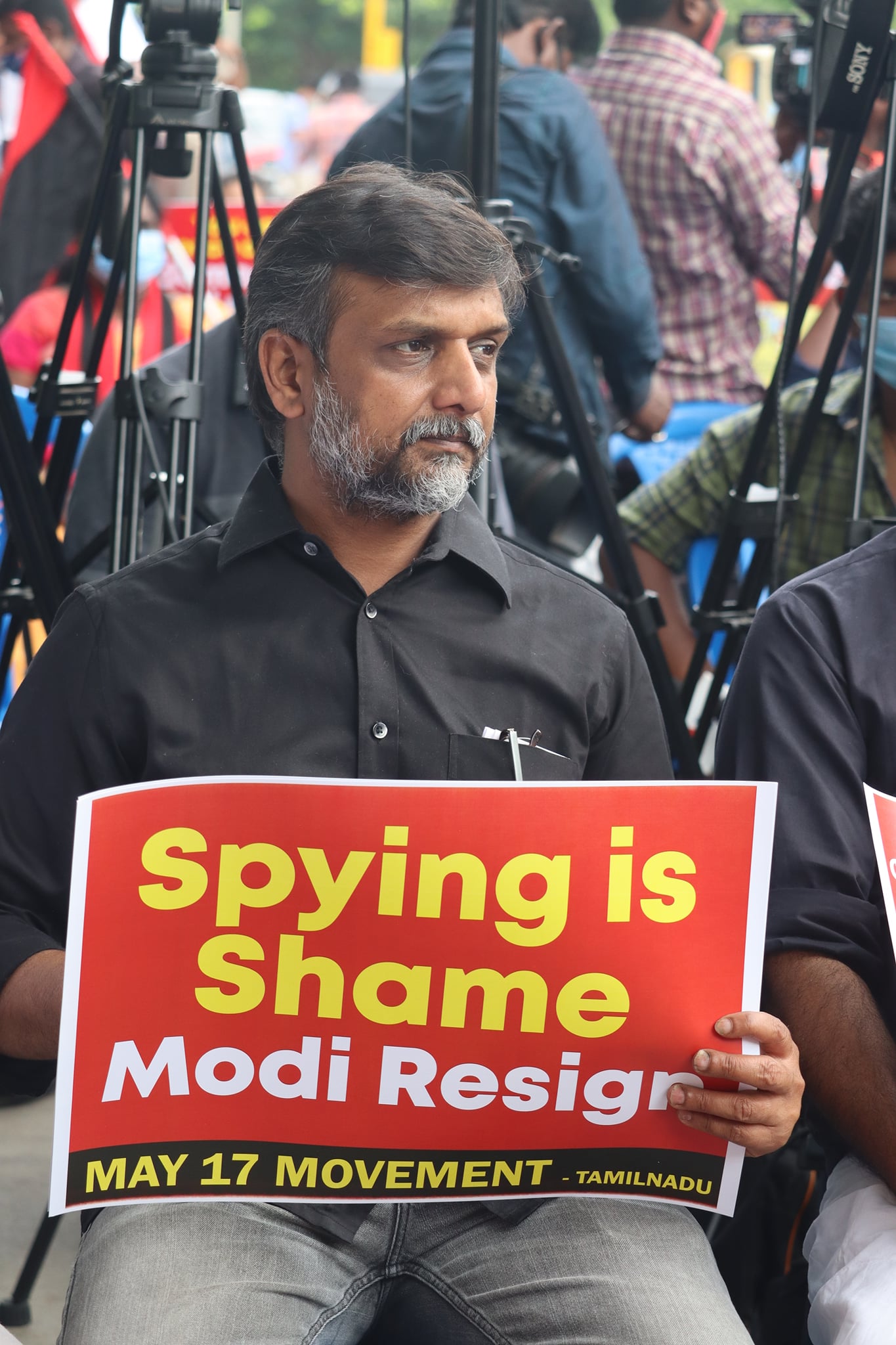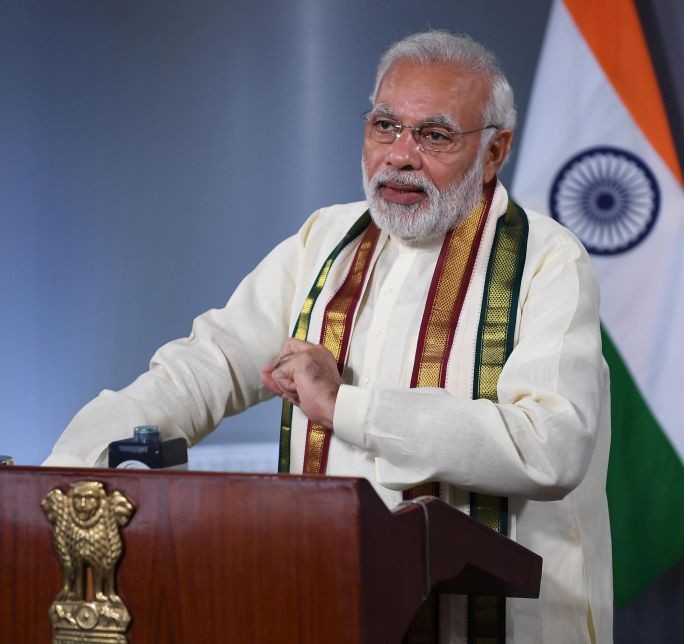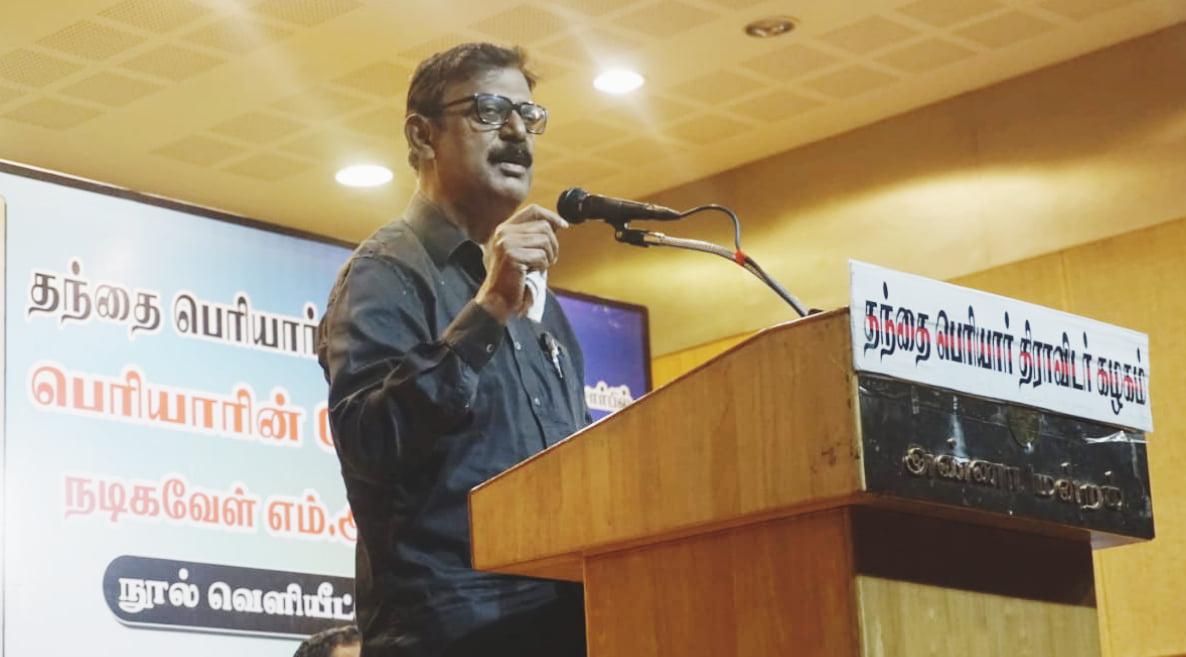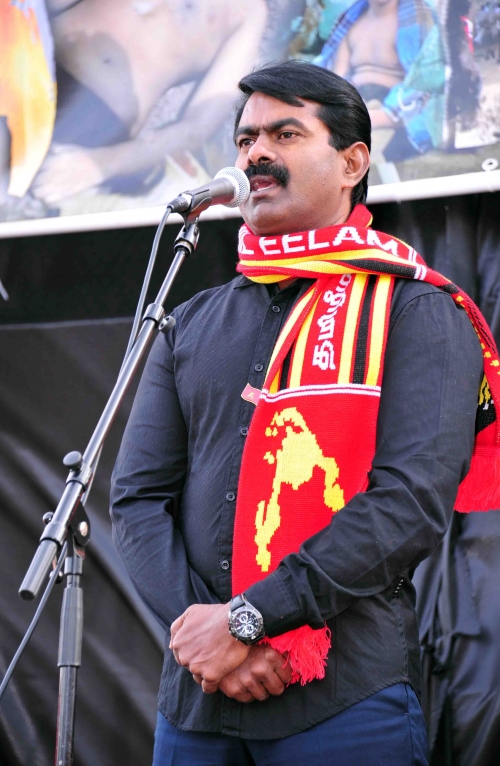On the 27 July, The Wire reported that the phone numbers of a number of Tamil Nationalists and Periyarist activists had been found among a leaked database of over 50,000 numbers listed as potential targets for surveillance by a client of the Israel-based NSO group.
Those targeted include, Naam Thamizhar Katchi’s (NTK) Seeman, May 17 movement’s Thirumurugan Gandhi, Thanthai Periyar Dravidar Kazhagam’s K. Ramakrishnan and Dravidar Kazhagam treasurer Kumaresan.
The Verge reports that the spyware, developed by private Israeli contractors known as the NSO Group, allows users to infect a target’s phone and sends back data, including photos, messages, and audio/video recordings. The software itself cannot be traced back to the government’s using it, a key feature of the spyware for clandestine operations.
Amongst those targeted through the software are hundreds of politicians and government workers — including three presidents, 10 prime ministers, and a king — plus 189 journalists, and 85 human rights activists.
The Wire notes that it is difficult to ascertain if the numbers from the potential list were actually infected.
May 17 Movement - Thirumurugan Gandhi

Thirumurugan Gandhi
Gandhi is the founder of the May 17 movement, an organisation that advocates for justice and accountability for victims of the genocide of Tamils committed by the Sri Lankan state which culminated in 2009. The organisation describes itself as a 'Tamil nationalists movement, working for the welfare of the Tamil people'. It aims to follow Ambedkarite, Periyarist and Marxists principles. At it's core, the organisation seeks justice for the Tamil people and to promote democracy and social justice in the wider region.
Speaking to Abhay Regi of The Caravan, Gandhi details why the government would have wanted to surveil him and how it was used to 'further oppress our organisation' and not to 'learn anything new'.
"I think it first needs to be stated that the May 17 Movement has never hidden anything. We are an organisation that has always been fighting for greater democratic space, and we have that same democratic space internally. We are open about our political principles and about what political actions we are going to take. What we believe in is very clearly established in the books and pamphlets we publish. For all of our meetings, we also take police permission as the law requires.
In a sense, their surveillance hasn’t earned them anything, they wouldn’t learn anything new about me that we haven’t already made clear. If they do use something like Pegasus to attack us, it is only to help them in implicating us in crimes we didn’t commit or to further oppress our organisation. That is something they have done for years because they are scared of what we stand for."
Gandhi noted how the May 17 movement had publicised the Indian government's involvement in the Tamil genocide and had thus become a target in its surveillance and harassment.
"In 2012, the UN published a report called the Petrie report detailing their handling of the genocide and the information they had at that time. The report had been heavily redacted when it was given to the public. We were able to get a copy of the unredacted file and we shared it widely pointing out clear markers to the role of India and the United States in aiding the genocide. We held several press conferences in Chennai, Bengaluru, Mumbai and Delhi publicising this.
Shortly after that, in 2013, the Permanent Peoples’ Tribunal met in Bremen in Germany to look into the genocide. [The Permanent Peoples’ Tribunal is an independent, international civil-society collective that conducts proceedings into serious and systemic violations of the rights of peoples.] I had also attended the tribunal and presented evidence for the case against India. Other groups presented evidence against the UK, US and of course, Sri Lanka. Their judgment clearly underlined that the Indian state was complicit in the genocide. We also ensured that this was widely publicised so that we can begin seeking justice.
It was the first time there was widespread knowledge about, and opposition to, India’s role in the genocide. I think since then we have been in the crosshairs of the Indian government. And since then, they have been attacking both me and the organisation."

Narendra Modi
Following the denial Modi's government of using the Pegasus malware, Gandhi expected this denial and noted that those targeted would be considered as a 'threat' to the government.
"if you simply look at the list of people who were infected with the malware, it is very easy to surmise that only the government and Modi would have seen all of them as a threat. Nobody else fears so many journalists, human-rights activists, opposition politicians and bureaucrats.
Their denial is largely immaterial, we knew they would deny it. I think what we need to fear is the potential uses they can have for a technology like this"
Read the full interview at The Caravan here.
Thanthai Periyar Dravida Kazhagam - Kovai Ramakrishnan
 Kovai Ramakrishnan
Kovai Ramakrishnan
Kovai Ramakrishnan, is the president of the Thanthai Periyar Dravida Kazhagam (TPDK), a Periyarist, rationalist and anti-caste organisation based in Coimbatore, Tamil Nadu.TPDK is also a strong advocate for Tamils right to self-determination in Sri Lanka and 'an independent Tamil Eelam'.
Speaking to the Caravan Ramakrishnan stated that he was likely targeted with the malware because his work in advocating rationalism, communal harmony and inter-caste marriages has seriously hampered Bhraratiya Janata Party's (BJP) ability to grow in the city.
"There used to be shadow watches of us because of our pro-Eelam Tamil stance."
Ramakrishnan noted how he and his party were not new to government or police surveillance. TPDK held a pro-Eelam Tamil stance and had supported the LTTE in India in the 1980s before the government severed ties with them. Commenting on why the Union government would target TPDK now and whether there was state government involvement, Ramakrishnan was certain that the surveillance was being led by the Modi government.
"it was almost definitely used by the union government. If you look at the work I and the TPDK have been doing, it is largely issues that hurt the propaganda and policies of the BJP government, not the state government. We have consistently fought for linguistic rights, state’s rights in a federal set up, and most importantly for communal harmony and the annihilation of caste. These are issues that align with the Tamil Nadu government but are against the agenda of the Sangh Parivar who now control the union government."
The TPDK at its core is a Periyarist movement that fights for social justice, rationalism and against Brahminism. This comes against the core of the Sangh Parivar's (Hindu nationalist) ideology, which permeates the ranks of BJP. Ramakrishnan noted the goals of the TPDK and how it came to odds with BJP members locally in the Coimbatore region who had been trying to gain a foothold.
"More specifically, we have also been able to raise awareness against their agenda locally and work against BJP members trying to spread islamophobia and caste supremacy for political gain. The Coimbatore region is one of the only places they have any amount of support in Tamil Nadu and we have constantly worked to erode that support. It is because of grassroot organisations like us that the BJP have struggled to get a foothold in Tamil Nadu"
Read the full interview at The Caravan here.
Naam Thamizhar Katchi’s - Seeman

Seeman, the leader of the (NTK), is another potential target and has been a vocal supporter of Eelam Tamils. Responding to the revelations Seeman defended the NTK and stated:
“We are a people’s movement. Our movement was very involved in protesting Sri Lankan Tamils’ killings. I have been arrested in Canada and the United States, and I know I am under surveillance because the state thinks I will facilitate the reorganisation of the LTTE. I am well aware of the fact that I am being watched and we continue to work despite this knowledge. But this is very undemocratic and fascist,”
The NTK is an insurgent party which was able to secure almost 7% of the vote share during the 2021 assembly elections, despite failing to gain any seats.
Read The Wire.
